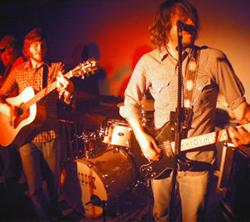 |
 |
 |
 |
| ::Interviews:: |
| review & interview content, as well as web site graphics & design, copywrite 2003-2004 Euphonia Online. use of materials granted only with reasonable purposes. |
 |
| interviewed by robby sumner |
 |
| Interview with Patrick October 3rd, 2005 |
Robb Maclean - Vocals, Guitar Patrick Carrie - Guitar, Vocals Justin Entsminger - Bass Matt Stephens - Drums |
| E: Patrick, you play in Limbeck, a hardworking band that's been out supporting a recent release... was the tour following this latest release different from your follow-up tour for your debut full-length?
Patrick: It was very much the same 'cause we were driving around in a van playing shows and sleeping on floors, but at the same time it was completely different. We had a fifth dude on stage playing keys, guitar and percussion. Halfway through the tour Matt left the band, and our buddy Jon from Milwaukee flew out to pick up with us. We had a new friend who we'd never previously met from Boston named Jason come out on the road with us for a few weeks. And the last few weeks of the tour, supporting Lucero was wild. E: Has your position or role in the band�not just instrument-wise�changed at all or turned out to be not what you expected when you joined the band? Patrick: Instrument-wise, it will always be evolving. It's part of us growing as a band. And it's always a good time to have four different things to tune before you get on stage. Other than that, I feel like I drive a lot, but sometimes I kinda dig it. Like on the way home from Minneapolis the other night, I drove from 11 a.m. to 6 a.m. the next day. It should've been to about 2 a.m. or so, but we blew out a tire. But yeah, I enjoy that. I guess my role in the band has evolved to making merch designs, booking shows... but it comes with the territory, y'know? If you want to make something work, you have to give it all you got. E: Where do you think perseverence and the ability to improvise rate among the top required characteristics a band needs to become successful? Patrick: They are the top required characteristics. They're the top. You never know what to expect, so expect the worst and keep on. That leads to good improvisational skills on and off stage. E: Your band has been described as "alt-country," with some country sensibility that's been turning out real popular among indie fans. Do you consider yourselves a bridge between two genres�commonground for two types of fans? Patrick: Definitely. We consider ourselves a gateway drug... of the musical sense. We came up through indie rock, and found some music we really dig and feel comfortable with. Like the Dixie Chicks and Nashville Star... Just kidding. But we got some good old Bob Dylan records, Big Star, Gram Parsons, etc., and found ourselves loving all of it. I don't know how the people coming from more of the country side of things feel about us. Actually, I don't know how either side feels. Now I feel like I made a rift between the two. It's like the Osmonds. A little country, a little rock n' roll. We like to play. And I really do like the Dixie Chicks. E: In this day and age of music, do you think lasting success can still be found by doing a typical sound untypically well? How essential is total innovation in a decade where new bands form every day? Patrick: For lasting success, it's about how you play the game. Slow and steady wins in my book. You can get on the radio and on TV and make some money, but don't be surprised when all those people that liked you last month have moved on to the next random band that's featured in the same places. Grassroots is how it's done. Word of mouth is a gift. E: Does a band have to work toward developing a centralized community of listeners and fans? Or does it manifest naturally once you catch general interest? Patrick: A little of both. You definitely need to work at it. Get out on the road. Hang out. Meet people. Meet bands. Play around. But word of mouth pulls you along as well. They're both equally important. It's a kinda catch-22, but one that you can handle. E: With up-and-coming bands sure to receive a lot of offers from booking agents, managers, PR agents, and road managers, how much paid professional help should a band on the rise consider taking on, as opposed to keeping aspects DIY? Patrick: At first? None. You learn the ropes better that way, so you know what you're actually paying people to do. At least that's how I feel about it. It's good to be knowledgeable. And you can't get that from a book. E: Now that Let Me Come Home has been released, where do you feel your band is in its ability to really branch out and mess around with what could be labeled the sound you've established thus far? Patrick: Completely able. We're gonna get a beach house and set up a studio and just get freaky on this next record. I should've capitalized freaky. E: Do you think a sudden�or even subtle�change in inspiration for your lyrical and musical subjects can have a huge impact on the music you write? Patrick: Definitely. During our last session of demos before we made the record, Robb wrote a song based on a dream he had, and although we didn't really have a ton of time to spend at the time, it's definitely a jump in a lot of different directions. He usually sticks to pretty solid references to people and places, but for some reason since the song in question was different lyrically, the musical outcome was wild, to say the least. E: Thanks a whole lot�you've been great. Patrick: Thank you so much. Those were good questions. |